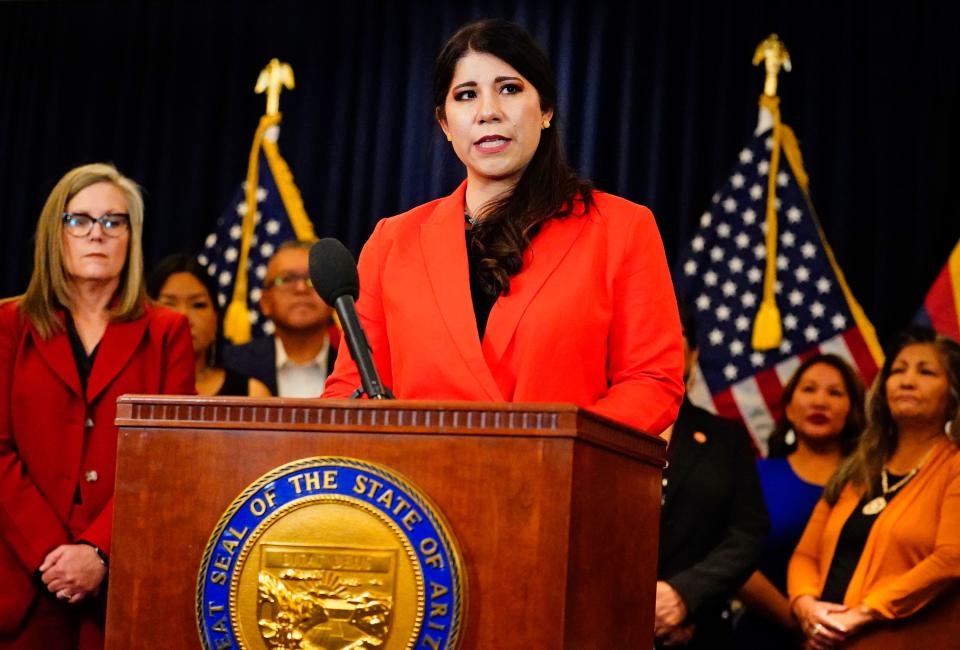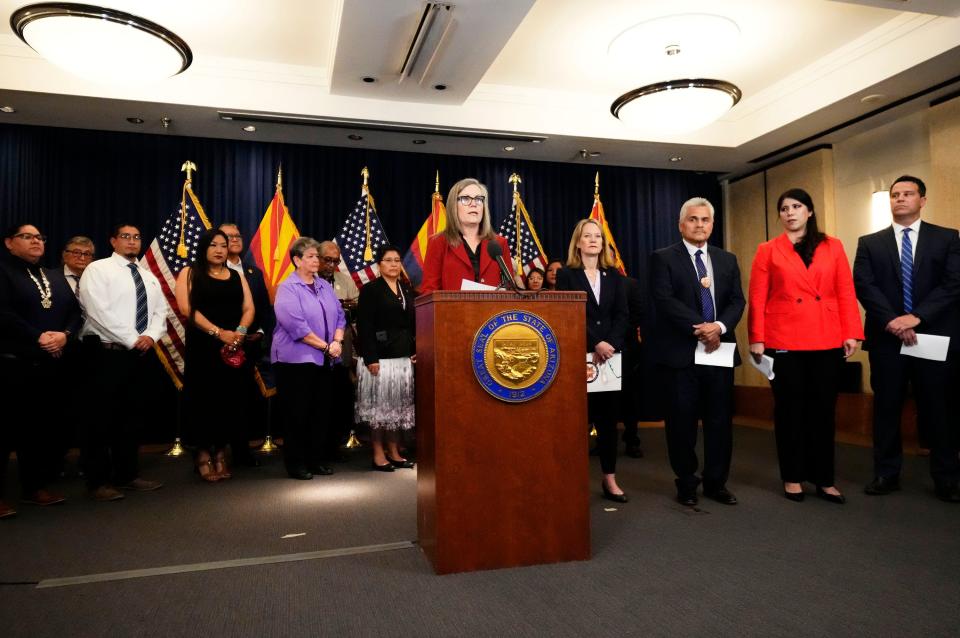It's been a year since Arizona's shocking Medicaid fraud announcement. What has changed?
- Oops!Something went wrong.Please try again later.
Arizona's Medicaid agency is a "completely new" organization one year after a humanitarian crisis caused by massive fraud was announced to the public, its leader said Thursday.
Carmen Heredia, cabinet executive officer for the state's Medicaid agency, said the organization has hired more staff, added an identification tool for providers, launched a public awareness warning campaign, added new prepayment reviews for fee-for-service claims and has made "dozens of policy and practice changes in the past year" to prevent future fraud and harm to patients, Heredia told reporters.
"We have really reformed the agency," said Heredia, who assumed the lead position at the agency in January 2023. "We've tackled the bulk of the problem, we really have."
The agency on Thursday planned to launch a web page with information and updates about the fraud: https://azahcccs.gov/SoberLivingFraud
Heredia on May 16, 2023, joined Arizona Gov. Katie Hobbs, state Attorney General Kris Mayes, plus multiple other state, federal and tribal agencies to announce they were investigating what's believed to be the largest Medicaid fraud in state history.
But the fraud did not involve solely financial crimes. Rather, it was part of a massive humanitarian crisis that preyed on Indigenous people who were trying to get sober. Rather than getting help, those people went missing, went untreated and sometimes died.
The state's Medicaid program is called the Arizona Health Care Cost Containment System (AHCCCS). While Mayes initially estimated the fraud had amounted to "hundreds of millions" of dollars, the estimate has since grown to $2 billion or more. The state also is facing wrongful death lawsuits filed by families who say their loved ones were victimized by the schemes.
"We are a new AHCCCS," Heredia said, but it's "still going to be a long journey ahead" for AHCCCS, which provides health coverage for 2.2 million Arizonans.
"We are not done in this work," she said. "There will continue to be a lot of change at the agency."
Investigators have said the fraud primarily targeted vulnerable people enrolled in Medicaid who were seeking help for drug and alcohol dependence. In many cases the people needing help either didn't get the treatment they needed or worse, they were plied with drugs and alcohol so that fraudsters could keep them housed in sober living facilities and continue billing Medicaid for either residential or intensive outpatient treatment.
AHCCCS does not reimburse sober living facilities, so in order to execute their scams, wrongdoers needed to have a relationship with a registered AHCCCS provider.
Typically, the providers who engaged in fraudulent billing were in the behavioral health realm, either residential behavioral health facilities or intensive outpatient clinics.
The fraudsters disproportionately targeted a small fee-for-service program called the American Indian Health Program and some were billing AHCCCS $1,000 or more per patient per day, the Arizona Attorney General's Office has said. Most AHCCCS enrollees are part of managed care plans, and the agency's fee-for-service division did not provide the scrutiny of providers that managed care generally does, Heredia said.
"If I compare the fee-for-service management division as functioning as a health plan does and the way a health plan staffs, it's very different," Heredia said. "Something I recognized from the get go is that it's a disparity. It's a disparity to this community, that this benefit wasn't managed with the safeguards that managed care has in place. We're building that. It's part of the reform and the journey that we're on."
Tribal leaders and members of the Phoenix group Stolen People Stolen Benefits have described disturbing scenes connected with the fraud, of vulnerable people getting lured and enticed into white vans to get purported treatment for drug and alcohol dependence. Some Native Americans went missing from their families because white vans took them to the Phoenix area, away from their homes, and also took away their phones and identification, group members have said.
Heredia said since she took over as the leader at AHCCCS, addressing the fraud and the humanitarian crisis it caused has been her "number one priority," and "absolutely the focus of my time here at AHCCCS."
When the fraud was announced last May, Hobbs, Mayes and Heredia announced the suspension of 100 providers for their role in a fraud across the state.
The number of suspended providers with open cases because of credible allegations of fraud is now at 284. The agency over the past year has terminated 79 providers over urgent quality of care concerns over patient health and safety. It was not immediately clear whether there was any overlap between providers suspended due to suspected fraud and those terminated over quality concerns.
The Arizona Attorney General's Office has issued more than 70 indictments connected with the fraud and there have been federal indictments, too.
In one of the more recent indictments, federal prosecutors say Kenneth Harrison and Courtney Haywood, who both live in Nevada, targeted the American Indian Health Program and bilked AHCCCS of more than $9.4 million in under two years. Harrison and Haywood operated a Mesa-based company called Aurtism, which according to the indictment is a combination of the words autism and art and the company was created to provide art therapy.
Federal investigators say Harrison and Haywood "grossly" overbilled AHCCCS for patients they treated, and billed for patients who were getting treatment from other providers. They also billed AHCCCS for patients they didn't treat, including patients who were in prison, jail or who were dead, prosecutors allege. The pair spent the taxpayer money they received from AHCCCS on real estate, luxury cars, retail purchases and travel, a news release from U.S. Attorney's Office for the District of Arizona says.
In another federal case, Thvoughn Lynden Curry and his wife, Alexis Daneen Curry of New River were arrested Nov. 2 on wire fraud and money laundering charges connected with an outpatient behavioral health clinic they operated in Mesa. An indictment says that between Feb. 1, 2021, and March 31, 2023, the couple submitted claims for reimbursement to AHCCCS totaling more than $12.5 million for services purportedly provided to about 185 individuals, 163 of whom were insured through the American Indian Health Program.
AHCCCS officials say they've taken significant steps to prevent more fraud, though some providers have said the crackdowns are going too far, causing unreasonable wait times for payments and approvals and are hurting legitimate providers.
Heredia said Thursday that she's aware of the complaints and agency officials are working to address concerns. But she said that some of the fraudulent practices became such an industry standard that by adding oversight, a cultural shift has had to happen, she said.
"The wait times are there. They are real because of the added scrutiny," she said. "It's a level of oversight that wasn't in place before. We're working on releasing some of those bottlenecks with the staff we've hired, with the technology that we're putting in place. We want to get back to processing this more quickly."
Reach health-care reporter Stephanie Innes at stephanie.innes@gannett.com or at 480-313-3775. Follow her on X, formerly known as Twitter, @stephanieinnes
This article originally appeared on Arizona Republic: Arizona's $2 billion Medicaid fraud was first announced one year ago


